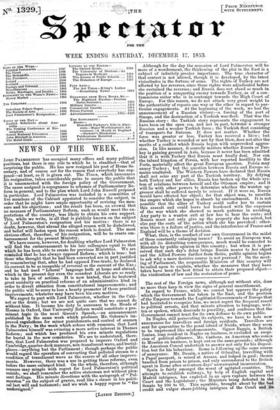NEWS OF THE WEEK.
Loan Paramisrow has occupied many offices and many political positions, but there is one role to which he is steadfast—that of surprising the public. He has now resigned his post of Home Se- cretary, and of coarse not for the reason that everybody has sup- posed—at least, so it is given out. The Times, which announces Ins resignation, takes considerable pains to assure the public that it is unconnected with the foreign policy of the Government. The cause assigned is repugnance to schemes of Parliamentary Re-
form in general' Lord Palmerston was included in a committee and to the plan which Lord John Russell proposed in particular. of in particular. of
five members of the Cabinet appointed to consider the subject, in order that he might have ample opportunity of revising the mea- sure and his objections; and the result has been, an avowal that no measure of Parliamentary Reform, such as would meet the ex- pectations of the country, was likely to obtain his own support. This while we write, is all that is publicly known on the subject of This, Palmerston's resignation and his motive: there is no doubt, however, that abroad the alleged reason will be disbelieved, and belief will fasten upon the reason which is denied. The most obvious effect, therefore, of his resignation, will be to create em- barrassment for the present Ministry. We have reason, however, for doubting whether Lord Palmerston will find the embarrassment to his late colleagues equal to that 'which he has been able to create for previous Ministries. We are reasinded that he has always opposed Reform; which is true: but those who thought that he had been converted are in part justified by remembering that, after he had opposed Free-trade he declared its current to be as incapable of reversal as the current' of the Exe ; and he had used "Liberal" language both at home and abroad, which in the present day even the soundest Liberals are so ready to take in lieu of actions. It is now hinted, that he bestowed great assiduity on practical reforms of an administrative kind in order to divert attention from constitutional improvements; and the public will be sorry to lose a hearty promoter of those practical improvements, whatever may have been his own motives. We regret to part with Lord Palmerston, whether in the Cabi- net or the drain; but we are not quite sure that we cannot do without him. It became his duty to announce to the Heads of Houses in Oxford, that University Reform would constitute a pro- minent topic in the next Queen's Speech,—an announcement published in the same week which produces Mr. Osborne's im- proved regulations for minor punishments and control of seamen in the Navy; in the week which echoes with rumours, that Lord Palmerston himself was evincing a more active interest in Thames Reform; and which has produced his own minute regulations for burial in the new cemeteries. We are to understand, there- fore, that Lord Palmerston was prepared to improve Oxford and Cambridge, quarter-deck manners, non-translucent wave, and burial- places—anything but the Parliament; though perhaps the public would regard the operation of converting that polluted stream to a condition of translucent wave as the source of all other improve- ments. However, there was a use in getting these reforms, even before the more enlarged kind. On the whole, therefore, although censure may mingle with regret for Lord Palmerston's political suicide, we shall remember the active statesman not without plea- sant feelings. His minute directions with the autograph of " Pal- merston" on the subject of graves, read like a clause in his politi- cal last will and testament; and we wish a happy repose to the undersigned."


































